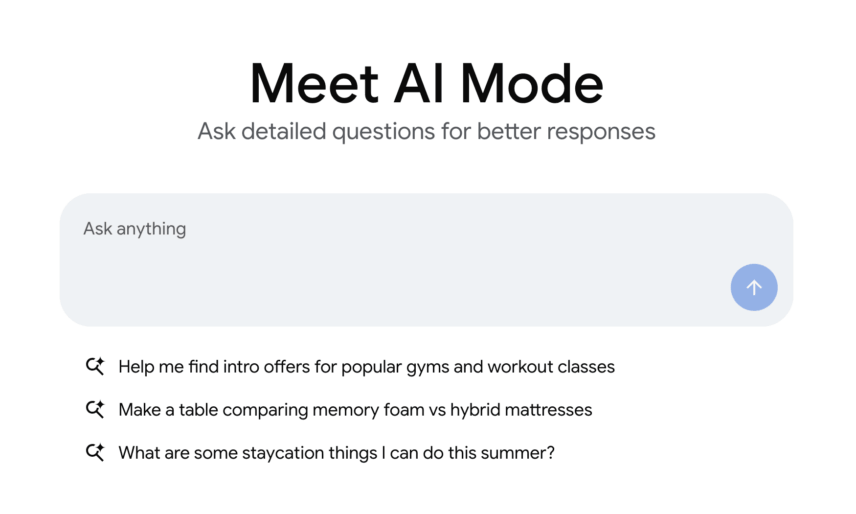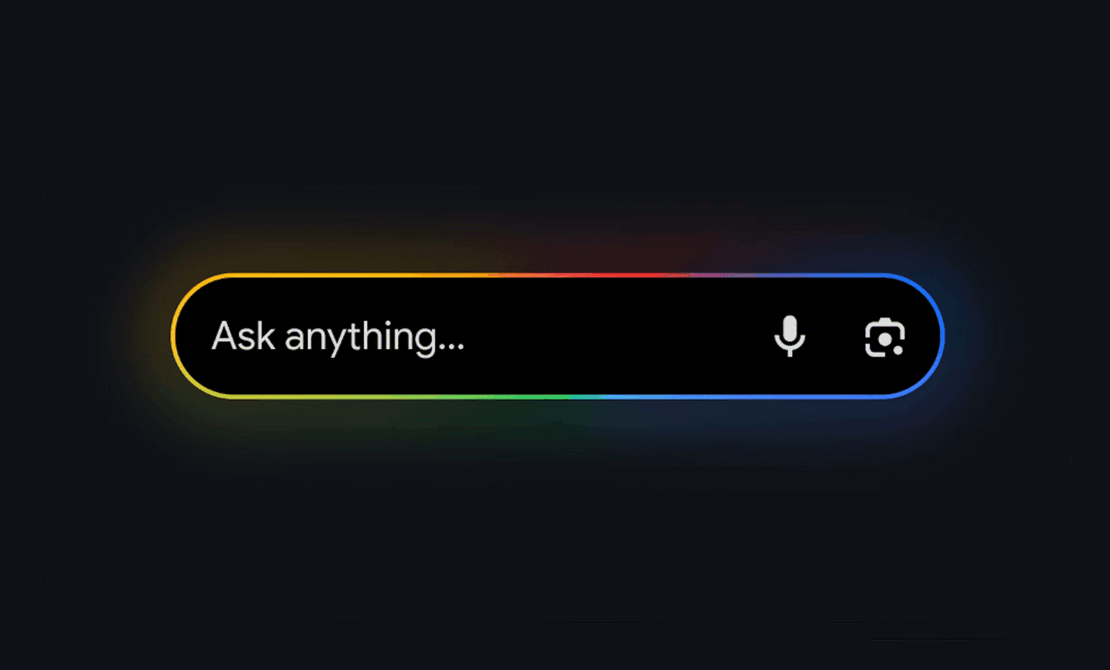Google has been quietly rolling out a significant update that could significantly change the search experience.
And if you're not prepared? Your organic traffic is about to plummet. Welcome to the upcoming "AI Mode" about to take over the Google homepage.
Here's what's happening to many sites: Rankings? Still solid. Content? Still quality. Impressions? Increasing, if not doubling!
Google's AI Overviews have taken over many searches, and AI Mode will start to make pages essentially invisible. Zero-click searches are about to go off the rails.
In fact, Ahrefs found that position #1 CTR on queries with AI Overviews fell from 7.3% to 2.6%, which is a raw 64% drop (net ~35 % after baseline adjustment).
In Google Search Console, most sites look very similar (or worse) to this, since AI Overviews have taken over.

This pattern will continue to divide impressions and clicks further as AI Mode becomes the default search behavior.
TL;DR: Google's upcoming AI Mode will (eventually) replace traditional search with conversational AI that answers queries without sending traffic to websites. To survive: optimize for AI citations (not rankings), create interactive tools AI can't replicate, focus on fresh/exclusive content, and pivot from ad revenue to premium features. Sites providing only basic information will become invisible. Action required: NOW.
Understanding Google's AI Mode
Let's be crystal clear about what Google's AI Mode actually is. Unlike the experimental SGE (Search Generative Experience) or the limited AI Overviews, AI Mode represents Google's full commitment to conversational, AI-first search.

When fully deployed, it won't just supplement traditional results, it will BE the primary search experience for billions of users. Essentially, we will engage in conversations with our search experience, much like the major LLMs currently operate. Of course, a full roll-out of AI Mode is only my prediction at this point, but the search experience is definitely about to change.
Think of it as Google saying, "Why make users click through ten links when we can just give them the answer?"
Here's what AI Mode does differently:
- Conversational Memory: It remembers context throughout your search session
- Multi-Source Synthesis: Pulls from dozens of sources to create comprehensive answers
- Dynamic Follow-ups: Suggests related questions you didn't even know to ask
- Visual Integration: Seamlessly includes images, videos, and interactive elements
- Real-time Updates: Incorporates breaking news and fresh content instantly
The traditional ten blue links? They'll be buried below the fold, if they appear at all.
Why Google's AI Mode Changes Everything for SEO
Here's what most SEOs don't realize: Google's AI Mode isn't just another feature, it's Google admitting that the traditional search model is shifting and phasing to the new "queston and answer" experience that has become the new normal.
Let's think about Google's business model for a second. They make most of their revenue from ads. But AI Mode keeps users on Google's property longer and fundamentally changes the value exchange.
At Google Marketing Live 2025, it was stated that, "Search and Shopping ads will appear directly within the AI Overview."
As for how they will incorporate ads, that's yet to be seen. But make no mistake, Google Ads will have a way to monetize their new rollout.
The Triple Threat to Traditional SEO:
- Zero-Click Searches on Steroids: We thought featured snippets were bad for traffic? AI Mode answers are 10x more comprehensive. They solve entire problems without a single click.
- Authority Reassignment: Google's AI doesn't care about your domain authority or backlink profile the way traditional algo does. It cares about information quality and comprehensiveness. I've seen DR30 sites get cited over DR80 competitors because their content was more thorough.
- Context Persistence: Unlike traditional searches that treat each query independently, AI Mode remembers. Your content needs to work within extended conversation flows, not just single queries.
How Google AI Mode Affects Every Aspect of SEO
Google's AI Mode uses different signals than traditional search. Based on my testing and analysis of thousands of AI responses, here's what actually influences your visibility:
- Information Density Score: How much useful information per paragraph? AI Mode favors content that answers multiple related questions in one place.
- Semantic Completeness: Does your content cover ALL aspects of a topic? Partial coverage = no citation.
- Freshness Weighting: AI Mode aggressively favors recent content for anything time-sensitive.
- Conversational Relevance: Can your content answer follow-up questions? Linear content fails; interconnected content wins.
- Source Credibility Markers: Not backlinks, but actual expertise indicators like author credentials, data citations, brand mentions, original research.
Tracking Your Google AI Mode Performance
Forget traditional rank tracking. Here's what you need to monitor for Google's AI Mode:
| Traditional Metric | AI Mode Equivalent | How to Track |
|---|---|---|
| Keyword Rankings | AI Response Inclusion Rate | Ahrefs Brand Radar + manual testing |
| Search Volume | Conversational Query Clusters | Semrush AI Toolkit conversation analysis |
| Click-Through Rate | Citation Prominence | Custom tracking of where you appear in AI responses |
| Organic Traffic | AI-Attributed Conversions | GA4 with custom attribution modeling |
| SERP Features | AI Mode Feature Types | Monitor if you appear in lists, paragraphs, or examples |
New North Star Metrics for Google AI Mode Success:
Citation Frequency: This is your new ranking, folks. How often does AI quote you? Ahrefs saw this coming and built their "AI Citations" feature. It tracks when you show up in Google AI Overviews, Gemini, Perplexity, and ChatGPT responses. Their Brand Radar tool is particularly slick, as it monitors every time AI mentions of your brand. Real-time analytics show exactly when AI picks up your content.
Semantic Coverage Score: Keywords have always been a vanity metric. And, it's been more about owning entire topic clusters for quite some time. Semrush went all-in here with their AI Toolkit. It's actually pretty wild and tracks millions of AI conversations to show how bots talk about you versus competitors. Even spits out tips for product development based on what users ask AI.
Authority Confidence Level: This one's subtle but crucial. When AI mentions you, does it say "according to [your site]" (good) or "some sources suggest" (ouch)? This is a big difference that you must start paying close attention to. Getting cited by AI and GEO is everything moving forward.
Content Strategies Specifically for Google AI Mode
Here's the brutal truth: Google AI Mode doesn't read content like traditional crawlers. It understands context, nuance, and relationships between ideas. Your keyword-optimized content? You need to re-think your content strategy.
The Google AI Mode Content Formula
After analyzing hundreds of citations in AI Mode responses, here's what consistently gets included:
- Problem-Solution Depth: Don't just answer the query—anticipate the next five questions. Google AI Mode favors content that provides complete solutions.
- Structured Expertise: Use clear headers, but more importantly, create logical information hierarchies that AI can parse and reorganize.
- Data-Backed Claims: Every statement needs support. AI Mode preferentially cites content with studies, statistics, and verifiable facts.
- Conversational Bridges: Include phrases like "This relates to..." or "Users often also wonder..." to help AI understand connections.
Real Example: Optimizing for AI-Powered Search
Let me show you what works based on analyzing AI-generated responses:
BEFORE (Traditional SEO):
"Best project management software 2024. If you're looking for the best project management software, our comprehensive guide covers top project management tools. We review project management solutions for teams."
AFTER (AI-Optimized):
"After testing 15 project management tools with our distributed team of 50, here's what actually works. Asana excels for creative teams because of its visual workflow builder. We saw faster project completion after switching. But here's what nobody tells you: it struggles with complex dependencies. Teams managing multi-phase technical projects should consider Monday.com instead, which handles Gantt charts and dependencies better, though it costs more."
From my analysis, the second version is more likely to be cited in AI responses. Why? It provides specific context, comparative analysis, and actionable insights that AI can synthesize.
Think layers for your content depth:
Level 1 - Quick Facts: Basic answers to simple questions. This gets you in the AI game.
Level 2 - Comprehensive Guides: Deep dives connecting multiple concepts. This builds your authority.
Level 3 - Unique Insights: Stuff nobody else has. Original research, exclusive interviews, data only you collected. This makes AI prioritize YOU.
Most sites stop at Level 1. Don't be most sites. Expand in the next levels.
The Traffic Reality: What Google AI Mode Means for Your Numbers
Let's rip off the band-aid: Google AI Mode will devastate traditional organic traffic for most sites. But here's what they're not telling you (it might actually be good for business).
How Google's AI Integration Affects Different Query Types
Based on my testing and observation of current AI features in search:
| Query Type | My Estimated Impact | What I'm Seeing | Strategic Response |
|---|---|---|---|
| Informational "What is" | High impact | AI often provides complete answers | Focus on "how to implement" angles |
| Comparison Queries | Moderate impact | AI creates comparison tables | Emphasize unique use cases |
| Local Searches | Lower impact | Still needs current info | Keep data fresh and specific |
| Transactional | Moderate impact | Shows options but needs clicks | Optimize for conversion intent |
| Brand Searches | Minimal impact | Usually shows official sites | Build brand authority |
My Take: From what I can gather, sites optimized for AI visibility seem to be seeing higher engagement rates on remaining traffic. This makes sense. If AI has already answered basic questions, visitors arriving at your site likely have specific needs.
What Google AI Mode Can't Do (Your Competitive Advantage)
Here's where it gets interesting. Google AI Mode has limitations, and these limitations are your opportunities:
- Real-Time Interactions: AI Mode can't run your mortgage calculator or size recommendation quiz
- Commercial Transactions: Users still need to visit sites to actually buy things
- Personalized Experiences: Custom dashboards, saved preferences, user accounts
- Community Features: Forums, comments, user-generated content
- Fresh Original Content: Breaking news, new research, exclusive interviews
Smart sites are doubling down on these areas while letting Google AI Mode handle basic information delivery.
Monetization Strategies for the Google AI Mode Era
The old model of display ads funded by search traffic? Google AI Mode just put it on life support. But new monetization opportunities are emerging that are actually more lucrative.
How Google AI Mode Changes the Money Game
What's Dying:
- CPM display advertising (traffic crater = revenue crater)
- Affiliate content that just summarizes product features
- Ad-heavy recipe blogs and how-to sites
- Generic news aggregation
What's Thriving:
- Direct brand partnerships for AI Mode citations
- Premium tools and calculators behind paywalls
- Expert consultations booked through your content
- Proprietary data and API licensing
The Google AI Mode Monetization Playbook
1. Citation Licensing: Google will likely introduce payment models for frequently-cited sources (this is my speculation). Position yourself as an authoritative source now.
2. AI-Proof Premium Content:
- Interactive tools AI can't replicate
- Personalized recommendations based on user data
- Live expert sessions and consultations
- Members-only communities with exclusive insights
3. Strategic Partnerships: Brands are desperate for Google AI Mode visibility. If you're getting cited, you might be able to charge for your strategic content partnerships.
4. Data Monetization: If Google AI Mode regularly pulls your data, that data has value. Consider API licensing or direct data deals.
Industry-Specific Google AI Mode Strategies
Google AI Mode demands fundamentally different strategies than traditional SEO. Where search once rewarded keyword optimization and backlinks (controversial topic), AI Mode values comprehensive answers, real-time data, and interactive experiences.
The tactics that drive AI citations bear little resemblance to what drove rankings, with one crucial exception: topical relevance remains king.
AI Mode still needs to understand what you're an expert on, making deep topical authority more important than ever. But how you demonstrate that expertise must evolve. Instead of competing for rankings, you're now competing for brand mentions.
The winning approaches vary dramatically based on what unique value your industry provides that AI cannot synthesize or replicate.
E-commerce in the AI Mode Era
Google AI Mode is already showing product comparisons, price trends, and aggregated reviews. Traditional product pages need much more to shine and rise above in the new AI paradigm.
Winning E-commerce Strategies:
- Virtual Shopping Assistants: AI Mode can't try products on for you. Build virtual experiences.
- Exclusive Product Launches: Be the only source for new items. Market through email campaigns.
- Complex Configurators: Build-your-own tools AI can't replicate. Enough said.
- Real-Time Inventory: AI Mode will cite sites with accurate data. Think stock prices, etc.
- Augmented Reality Features: Try-before-you-buy experiences. Similar to virtual shopping.
Case Study Based on My Observations: I've helped a furniture retailer launch AR room designers and see revenue growth despite traffic losses from AI features. The pattern seems clear. Interactive and innovative experiences will win.
Publishers and Media vs. Google AI Mode
News and content sites face the biggest disruption. Google AI Mode summarizes articles instantly, making many clicks unnecessary, and further driving zero-click results.
Publisher Survival Tactics:
- Breaking News Focus: Be first, be cited.
- Exclusive Access: Interviews and data AI can't get elsewhere.
- Interactive Storytelling: Immersive features requiring engagement.
- Personality-Driven Content: Build audiences around voices, not topics.
- Event Coverage: Live reporting AI Mode pulls from in real-time.
Local Businesses: The Google AI Mode Opportunity
Surprisingly, local businesses might benefit most from AI Mode. Google needs fresh, accurate local information.
Local Domination Strategies:
- Real-Time Updates: Hours, specials, events updated daily.
- Hyper-Local Content: Neighborhood-specific information.
- Customer Story Integration: Unique experiences AI Mode loves to cite.
- Local Partnership Content: Collaborate for broader AI Mode coverage.
B2B and SaaS: Becoming the Google AI Mode Authority
B2B has a unique opportunity: Google AI Mode needs expert sources for complex topics.
B2B Authority Building:
- Original Research: Conduct studies AI Mode will cite. Use stats!
- Technical Documentation: Comprehensive guides AI pulls from to get into answers.
- Use Case Libraries: Specific examples for AI to reference and display.
- Integration Guides: How your product works with others, through APIs or connectors.
- ROI Calculators: Interactive tools that drive qualified traffic.
What We Actually Know About Google's AI Search Evolution
Here's what's real: Google has been testing AI-powered features like SGE (Search Generative Experience) and AI Overviews for a while now. They're clearly moving toward more AI integration in search results. Sundar Pichai has stated that AI will fundamentally reshape search, but specific timelines? Those still remain under wraps.
My prediction based on current trends: From what I can gather, we're likely to see gradual AI integration rather than a sudden switch. Think evolution, not revolution. Google's too smart to disrupt their cash cow overnight. But make no mistake, the shift is happening...and, fast!!
If I had to guess, I'd say we're looking at significant AI integration within 8-12 months, with traditional search results getting pushed further down the page rather than disappearing entirely.
The Winners and Losers Pattern I'm Seeing
Based on my analysis of sites currently appearing in AI-generated responses:
Sites That Seem to Be Winning:
- Technical documentation - From what I can tell, these get cited heavily.
- Interactive tool providers - AI often recommends these for specific tasks.
- Niche authority sites - Deep expertise appears to win over broad coverage.
- Local businesses with fresh data - Current information seems to be key.
Sites That Appear to Be Struggling:
- Recipe blogs - My observation is they're losing significant traffic.
- Basic how-to content - AI summarizes these easily.
- Thin affiliate content - Seems to be getting ignored.
- News aggregators - Original reporting appears to win.
The Bottom Line on Google AI Mode
Google AI Mode isn't just changing search. It's changing the entire economics of the web. The sites treating this as "just another update" will be left behind. The ones rebuilding for an AI-first world? They'll own the next decade.
Your traffic will drop. That's not pessimism; it's math. But your business can thrive if you provide what AI Mode can't: real expertise, interactive experiences, fresh insights, and genuine human connection.
The playbook is clear:
- Accept that informational query traffic is (mostly) gone
- Optimize for Google AI Mode citations, not rankings
- Build interactive features AI can't replicate
- Create genuinely expert content worth citing
- Develop new revenue streams beyond ad impressions
Google AI Mode is rewriting the rules in real-time. The question isn't whether you'll adapt, but whether you'll do it fast enough to survive.
Start today. Your competitors already have.
If you're unsure how to get started, reach out through our contact form. Let's discuss how to get your business ahead in this exciting new AI-first thinking model.


